The pilot ESARDA (European Safeguards Research and Development Association) summer course on nuclear non-proliferation and nuclear safeguards were held from September 4 to 8, 2017, at Conference Hall, Liuqing Building, Department of Engineering Physics (DEP), Tsinghua University, China. This course is a full five-days program of intensive and extensive lectures.
A welcome and opening ceremony of the course was offered in the morning on the first day. Mr. Shen Lixin, deputy director-general of Department of System Engineering from China Atomic Energy Authority (CAEA), Prof. Tang Chuanxiang, secretary-general of National Education Steering Committee for Nuclear Engineering from Ministry of Education, Prof. Wang Xuewu, head of DEP, as well as Prof. Zeng Shi, director of the course on the Chinese side, presented opening speeches. The course attracted about 70 participants from colleges and universities, nuclear-related corporations or research institutions, and international students of 7 countries in Tsinghua International Master’s Program for Nuclear Engineering and Management of 2017.
The Joint Research Center (JRC) of European Commission (EC) sent 7 lecturers in the field of nuclear safeguards and non-proliferation to Beijing. They are Mr. Patrice Richir, the course director on the EC side and head of the advanced safeguards measurement from Monitoring and Modelling Laboratory, Mr. Paolo Peerani, head of unit of nuclear decommissioning of JRC nuclear facilities and related waste management, Prof. Quentin Michel, head of the department of political science from Liège University, Prof. Pierre Frigola, European Commission consultant, Mr. Brian Aubert, section head of state factor analysis of Division of Information Management from International Atomic Energy Agency, and Mr. Cary Crawford, senior program manager of Safeguards and Security Technologies from Nuclear Security and Engineering Directorate. The first five of them presented the opening ceremony and Mr. Richir delivered a speech on behalf of the lecturers. The ceremony was chaired by the deputy head of DEP, Prof. Gao Zhe.
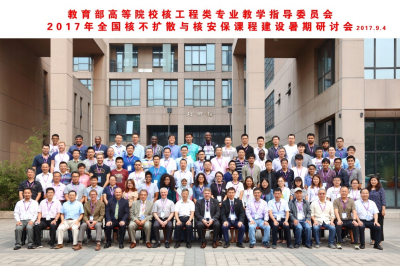
Group photo of the opening ceremony
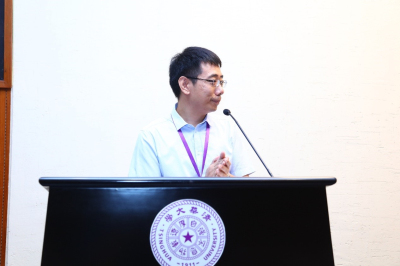
Prof. Gao Zhe in his speech
Prof. Tang emphasized the importance of the ESARDA course and pointed out that in the field of nuclear non-proliferation and nuclear safeguards, there is an acute shortage of relevant experts in China, which affects our country playing its due role in the international community and to safeguard our interests for peaceful use of nuclear energy. Nuclear non-proliferation and nuclear safeguards has become an important discipline. In the teaching of nuclear engineering, it is necessary to increase the contents of nuclear non-proliferation and nuclear safeguards. Meanwhile, it is indispensable to build the corresponding courses in accord with our own national conditions and context.
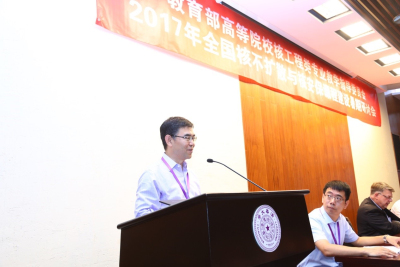
Prof. Tang Chuanxiang in his speech
Mr. Richir introduced the course history, its main objective and the collaboration background. He sincerely hoped that all participants get maxim of the benefit of all the materials which are presented by the lecturers. He also told the participants the story about how this course came to China.
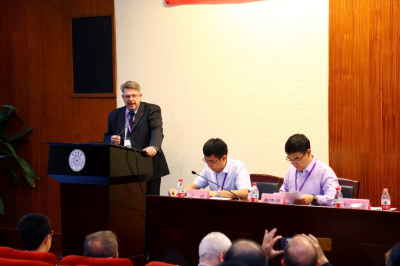
Mr. Patrice Richir in his speech
Mr. Shen used “right time and right place” to describe the coming of the course. The 4th Nuclear Security Summit was held in Washington D.C. last year, and nuclear safeguards was one of the hot topics during the discussions of national leaders and related nuclear industries. He pointed out that there is an important “3-S” concept for nuclear energy: nuclear safety, nuclear security, and nuclear safeguards, which is the fundamental principle for the peaceful use of nuclear energy. Tsinghua University has been ranked as the best engineering university in China. Furthermore, Department of Engineering Physics was founded in 1956 with the mission to provide advanced education of science and engineering for talented professionals in nuclear energy science and technology in China, and is obliged to take the task to cultivate the personnel equipped with the knowledge of 3-S as well as to provide a guidance of the relevant education to other colleges and universities.
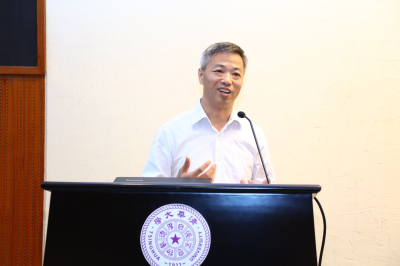
Mr. Shen Lixin in his speech
Prof. Zeng said: “Thanks so much to all participants for your time! And European experts from far away, thank you to take time of your busy schedule to Tsinghua. Moreover, CAEA, National Education Steering Committee for Nuclear Engineering of Ministry of Education, as well as DEP, thank you for your great support.” He also expressed expectation to all participants to try to open such a related course in China with Chinese characteristics.
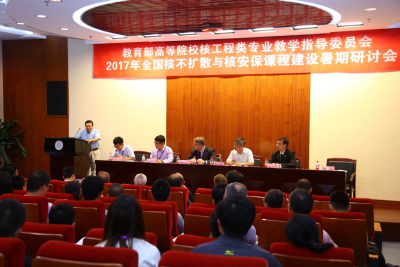
Prof. Zeng Shi in his speech
Prof. Wang gave an introduction to both the educational and scientific achievements at DEP. Furthermore, he emphasized that DEP will make great efforts to support the building of the course for the talents in need.
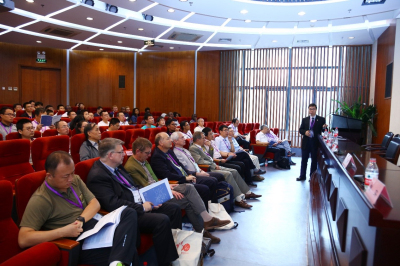
Prof. Wang Xuewu giving his welcome address
The content of the course module includes statistical accounting, GIF proliferation resistance and physical protection, principles of NMAC, international nuclear trade control, general principle of international trade, principles of physical protection, destructive analysis and nuclear forensics etc. During the course, all the lecturers and participants took a visit to China-US Center of Excellence on Nuclear Security. The deputy director general of the center, Prof. Xu Zhenhua, gave a brief but complete review of the status of nuclear nonproliferation and safeguards, China’s policies and activities, and the situation of the center. Afterwards, the deputy division director of Division of Tech R&D, Mr. Han Yeliang, served as a guide in the visit to various equipment and facilities of the center.
In the morning of September 8, an in-class quiz was first given to test what the participants learned. Following the quiz, Mr. Richir expressed his great appreciation on behalf of the lecturers to the successful organization and management of the course, and also to the support of DEP, the steering committee, as well as all the lecturing experts. Then Prof. Kang Kejun, Chairman of National Education Steering Committee for Nuclear Engineering, Ministry of Education, delivered a summary talk, in which he congratulated the participants for successfully completing the course, fully affirm the achievements of the course, appreciated sincerely the efforts of the lecturers and organizers, and expected all of us to make contributions to create a safe and peaceful world. Finally, the course attendance certificates were distributed to the participants.
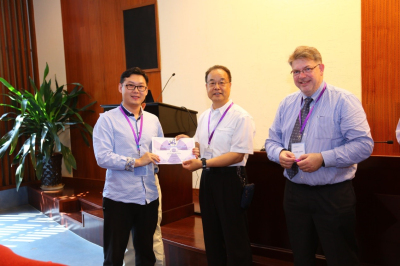
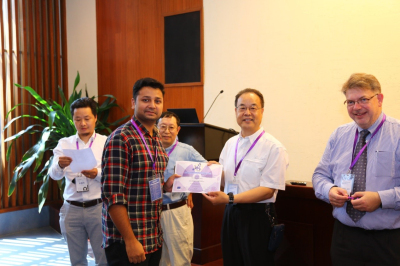
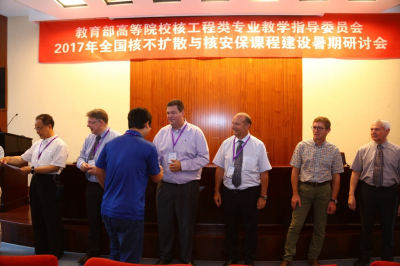
Moments of awarding certificates by Prof. Kang, and the lecturers
Additional information
Course Background:
With the development of nuclear energy industry, more and more institutions, organizations and countries are engaged in nuclear and nuclear related fields. China is actively involved in the development of nuclear science and technology for nuclear energy, and the nuclear technologies with China’s marks are going to the world. While making peaceful use of nuclear energy, reducing the risk of nuclear proliferation is a major challenge to the world today that needs be tackled by the international community. China’s active respond to this challenge is not only our national responsibility, but also a measure to safeguard common national and international interests.
Within the framework of Administrative Arrangement no 2016/373-289 “Enhancing Capabilities of the Chinese Authorities and their Technical Support Organizations for the Safeguard of Nuclear Materials in the People’s Republic of China” signed between DG DEVCO and DG JRC of the European Commission, the project “Implementation of an ESARDA Safeguards and Non-proliferation Course in People’s Republic of China” was defined, and a commitment letter was signed in December 2016 by Department of Engineering Physics, Tsinghua University, the People’s Republic of China and JRC of the EC. Based on the commitment, both sides agreed to have the pilot ESARDA course organized in Beijing by Department of Engineering Physics. To benefit more participants not only from the area of education but also from the fields of nuclear industry, the course was organized in the name of National Education Steering Committee for Nuclear Engineering, Ministry of Education.
The Center of Excellence on Nuclear Security (COE):
The center, constructed with cooperation between China and the U.S., was completed one year ahead of schedule in December 2015, and went into formal operation in March 2016. During the 2016 Nuclear Security Summit, the Chinese President Xi Jinping stated that “The Center of Excellence on Nuclear Security I promised at the Summit in The Hague has been completed a year ahead of schedule and is now operational in Beijing … We will use existing platforms including the Center of Excellence on Nuclear Security and the China Customs Radiation Detection Training Center to carry out training of nuclear security professionals, exercises and exchanges regarding nuclear security technologies and other activities. We welcome the participation of Asia Pacific countries, countries along the Belt and Road and other developing countries in relevant projects and will stay in close cooperation with the IAEA.”
The COE has integrated mature and advanced technologies and equipment from China and other countries, including technology demonstration and training buildings, analytical laboratories, environmental laboratories, mock nuclear material bunker, mock facility for nuclear material accounting and control, response force training and drill facility, testing field for physical protection, international first class education & training facility as well as supporting facilities. The main functions of the COE include personnel training, research and development, international exchange, as well as testing and certification, covering a variety of areas such as nuclear security, nuclear safeguards and inspection, nuclear material control, physical protection and etc. The COE is a nuclear security exchange and training center with the largest scale, most comprehensive equipment and most advanced facilities in Asia Pacific Region and beyond.

